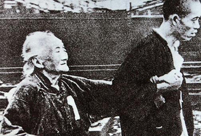 Chinese artists from Flight MH370 and their art
Chinese artists from Flight MH370 and their art
 Top 30 entrepreneurs under 30 in China
Top 30 entrepreneurs under 30 in China
 800-year-old ancient village in Shanxi
800-year-old ancient village in Shanxi
 World's top 10 most prestigious institutions
World's top 10 most prestigious institutions
 Chinese airborne troops conduct low altitude flight training
Chinese airborne troops conduct low altitude flight training
 Beautiful fisherwomen in SE China
Beautiful fisherwomen in SE China
 1,500-year-old coffin excavated from grassland in N China
1,500-year-old coffin excavated from grassland in N China
 See what Google glass captures at 'two sessions'
See what Google glass captures at 'two sessions'
 In pictures: beautiful women in different ages
In pictures: beautiful women in different ages
Third, demand creation. Cycles of institutionalized consultations and policy debates in major decision-making processes tend to generate, at regular intervals, a lot of public expectations, usually more positive than negative, for economic development. Such expectations in turn create new and often medium to long term demand. A typical five-year plan in China catches the attention of the vast part of the Chinese society, from private firms to state-owned enterprises to individual shareholders. The fact that China has been able to sustain an annual GDP growth rate of over 9 percent for over three decades is inseparable from these regular and predictable cycles of expectation and demand creation.
"The fact that China has been able to sustain an annual GDP growth rate of over 9 percent for over three decades is inseparable from these regular and predictable cycles of expectation and demand creation. "
Fourth, development administration. It's not far from wrong to claim that China has created its own model of development, an important feature of which can be called "development adminstration," in contrast to public administration. China's five-year national plans and CPC's annual economic conference are definitely part of China's development administration. The same is true with many local development strategies and plans. Chinese universities may eventually offer courses and even degrees in development administration just as degrees in public administration are common everywhere.
But the Chinese case may be unique, as the Chinese state, under the "socialist market economy," commands not only such Keynesian instruments as fiscal and monetary policies, but also other "tools," which may not be available in other countries, such as public ownership of land and of strategic resources as well as a largely performing state sector. These "tools" give the Chinese state greater leveraging power.
Fifth, minyi versus minxin. Behind all the above is the Chinese philosophy of governance, including, inter alia, the two distinctive concepts: minyi and minxin, the former referring to "public opinion", and the latter to "the hearts and minds of the people" (approximate English translation), which was first put forward by Mencius (372 - 289 BC). Minyi or public opinion can be fleeting and change overnight, while minxin or "hearts and minds of the people" tends to be stable and lasting, reflecting the whole and long-term interest of a nation. Over the past three decades, even under the occasionally populist pressure of minyi, the Chinese state has still generally practiced "rule by minxin". This allows China to plan for medium to long terms and even for the next generation, rather than for next 100 days or next election as in many Western countries.
China is still faced with many daunting challenges ranging from corruption to regional income gaps and environmental degradation. But China is indeed better than at anytime in its modern history. The country is now the world's largest laboratory for economic, social and political experimentation. There is a every reason to believe that China, which has a continuously adaptive political system, will reach its objective of becoming the world's largest economy in a decade's time -- with all the implications for China itself and for the rest of the world at large.
Zhang Weiwei is Director of the Centre for China Development Model Research, Fudan University in Shanghai.

 Chaihe village, pure and peaceful fairyland in snow
Chaihe village, pure and peaceful fairyland in snow Belgians warmly welcome arrival of China's giant pandas
Belgians warmly welcome arrival of China's giant pandas Female marines receive tactical training in NW China
Female marines receive tactical training in NW China Blood memory: Nanjing Massacre in 1937
Blood memory: Nanjing Massacre in 1937 Top 10 pure beauties in showbiz
Top 10 pure beauties in showbiz British WWII veteran: I can't forgive Japan
British WWII veteran: I can't forgive Japan Tongban's dream of prosperity
Tongban's dream of prosperity Chinese frigate Yancheng holds drills in Mediterranean Sea
Chinese frigate Yancheng holds drills in Mediterranean Sea A visit to comfort woman's home in South Korea
A visit to comfort woman's home in South Korea Fairyland? Qingdao in sea of clouds
Fairyland? Qingdao in sea of clouds Top 10 most handsome faces in Asia in 2013
Top 10 most handsome faces in Asia in 2013 Female celebs with beautiful long legs
Female celebs with beautiful long legs Cat 'guardians' in Forbidden City
Cat 'guardians' in Forbidden City Large numbers of ancient coins excavated in Inner Mongolia
Large numbers of ancient coins excavated in Inner Mongolia Leisurely life beneath Zhonggulou, where time travels slower
Leisurely life beneath Zhonggulou, where time travels slowerDay|Week|Month